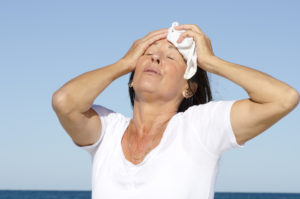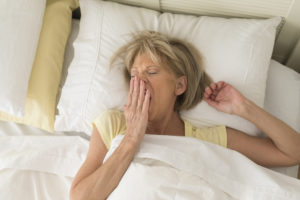Many women don’t realize they are having common menopause symptoms. They may see three or more doctors for their symptoms before they figure out that all of them are due to one reason – hormonal changes that occur naturally in every women.
One of the reasons it’s so hard to realize the symptoms are due to menopause is that they all can be due to other causes.
They also typically start between 5 to 10 years before menopause in a time that is called perimenopause. Perimenopause includes the years when symptoms begin through 1 to 3 years after menopause.
Here are the seven most common menopause symptoms for most women.
1. Hot flashes – Feeling warmth or having red blotches on the chest, neck or face, feeling intense heat for a few seconds up to 30 minutes. While they can be due to other things, hot flashes are the most common menopause symptom. Click here to download a PDF of 10 things that trigger hot flashes.

Woman outdoors suffering from hot flashes.
2. Irregular periods – It’s just about inevitable that the hormone swings of perimenopause and menopause are going to affect your menstrual periods. Irregular periods are one of the most common menopause symptoms. They may get longer, shorter, lighter or heavier. If it’s not normal for you, ask your healthcare provider to help you find out why.
3. Mood Swings – With hormonal changes comes mood changes. Some women say they feel “bitchy,” irritable, moody, anxious, or sad, like someone they don’t know inhabited their body. These common menopause symptoms can be challenging but can be helped with treatment.
4. Sleep problems – Nearly two thirds of women complain of sleep loss during perimenopause and menopause. Poor sleep makes other symptoms worse and can contribute to weight gain, high blood pressure, heart disease and diabetes.
Click here for a free
Sleep Diary to chart your sleep changes and to share with your healthcare provider so they can help you with this common menopause symptoms.
5. Vaginal Dryness – Women will say their vagina is so dry it feels like the Sahara desert. That can not only lead to painful sex but also chafing with walking or exercise. It can be easily treated with vaginal moisturizers or local estrogen or other hormones.
6. Sensitive Bladder – Loss of estrogen can thin out the tissues that support the bladder and increase the sensitivity of the bladder lining. All that can lead to more frequent urination, waking up at night, and loss of urine with laughing, sneezing or exercise. Fortunately, there are lots of things you can do to improve a sensitive bladder.
7. Loss of Libido – If you’ve noticed you’d rather be shopping than having sex, you’re not alone. And though libido seldom disappears completely, for many it does diminish. Yet only 7% of women are getting treated because they don’t tell their doctors and their doctors don’t ask them about it. But if you do discuss it with a knowledgeable provider, it’s likely to get better.Track your symptoms with Menopause Symptoms Chart. Get more information at DrMache.com.
What’s your biggest challenge? Let us know by leaving a comment. Please share with a friend you think this would help.


